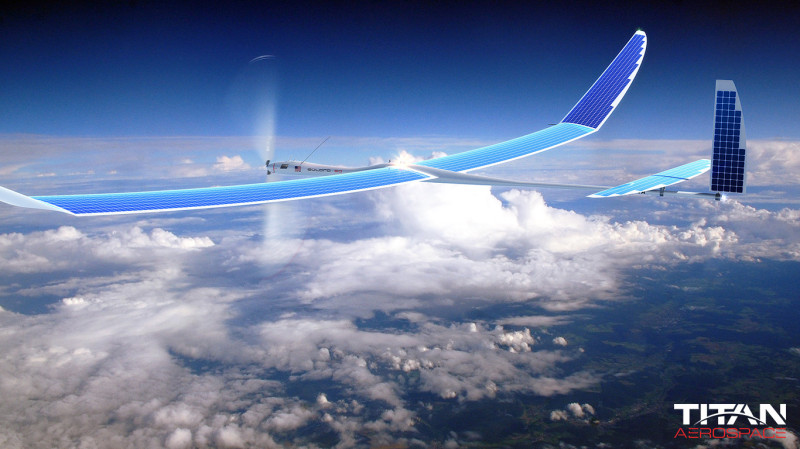It’s nothing new that tech companies compete among themselves, when it’s about acquiring a new company. Social media giant Facebook planned to acquire drone maker company Titan Aerospace, but all on a sudden beating Facebook, internet search giant Google has acquired it.
Earlier we had reported that Titan Aerospace was making two solar-powered UAVs named Solara 50 and Solara 60. The Solara 50 weighs just 159 kg (350 lb) and it would have a 50-meter (164-foot) wingspan, a length of 15.5 meters (54 feet). This UAV will offer a payload capacity of over 32 kg (70 lb). On the other side, Solara 60 is larger than Solar 50. It will be 60 meters (197 feet) across, with the ability to carry up to 100 kg (250 lb). The specialty of these UAVs is they will be able to fly for 5 years at a stretch.
Titan Aerospace mentioned that both the UAVs will have a speed of around 104 km/h (65 mph). The company also mentioned that the aircrafts (at least one of them) would be able to provide cell phone coverage for an area of over 6,500 square miles (16,800 sq km), offering the reach of over 100 ground-based towers. Each UAV will have around 3,000 solar cells, allowing to generate up to seven kilowatts of power during the day. There will be hundreds of watts of power that will be stored in its on board lithium-ion batteries, to keep its motor, autopilot, sensors and telemetry systems running throughout the night.
However, Facebook wanted to acquire Titan Aerospace to use the UAVs for offering internet in remote areas as well as those areas where internet connectivity is still not available. On the other hand, Google wanted to acquire Titan Aerospace in order to offer internet connectivity through air-borne balloons from the sky. But shattering Facebook’s dream, lately, Google has bought Titan Aerospace.
The Wall Street Journal (WSJ) has reported that Titan Aerospace team will work with Google’s existing Project Loon balloon team, as well as the Makani airborne wind turbine power company that Google acquired last year. But rather than be assimilated into the Google collective, Titan’s employees will stay in New Mexico under existing leadership.
A Google spokesperson has mentioned, “Titan Aerospace and Google share a profound optimism about the potential for technology to improve the world. It’s still early days, but atmospheric satellites could help bring internet access to millions of people, and help solve other problems, including disaster relief and environmental damage like deforestation.”
Although, Google has acquired Titan Aerospace, that doesn’t mean that Facebook is out of the game to deliver internet to the far corners of the globe. Last month, the social network obtained its own drone team by buying Ascenta, another company developing solar-powered flying platforms designed to stay aloft for a long period, for $20 million.
Source: Titan Aerospace
Thanks To: CNET
[ttjad keyword=”chrome-laptop”]



